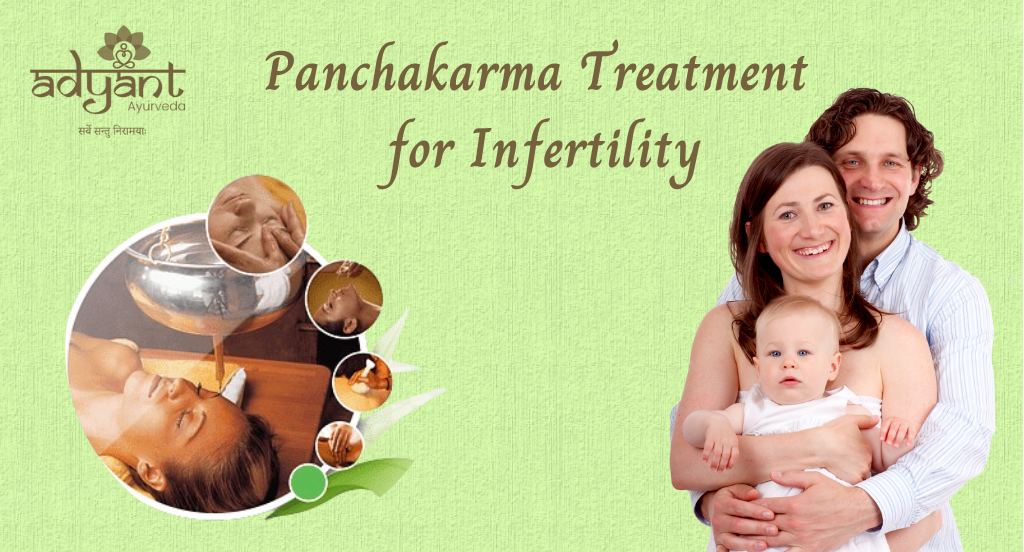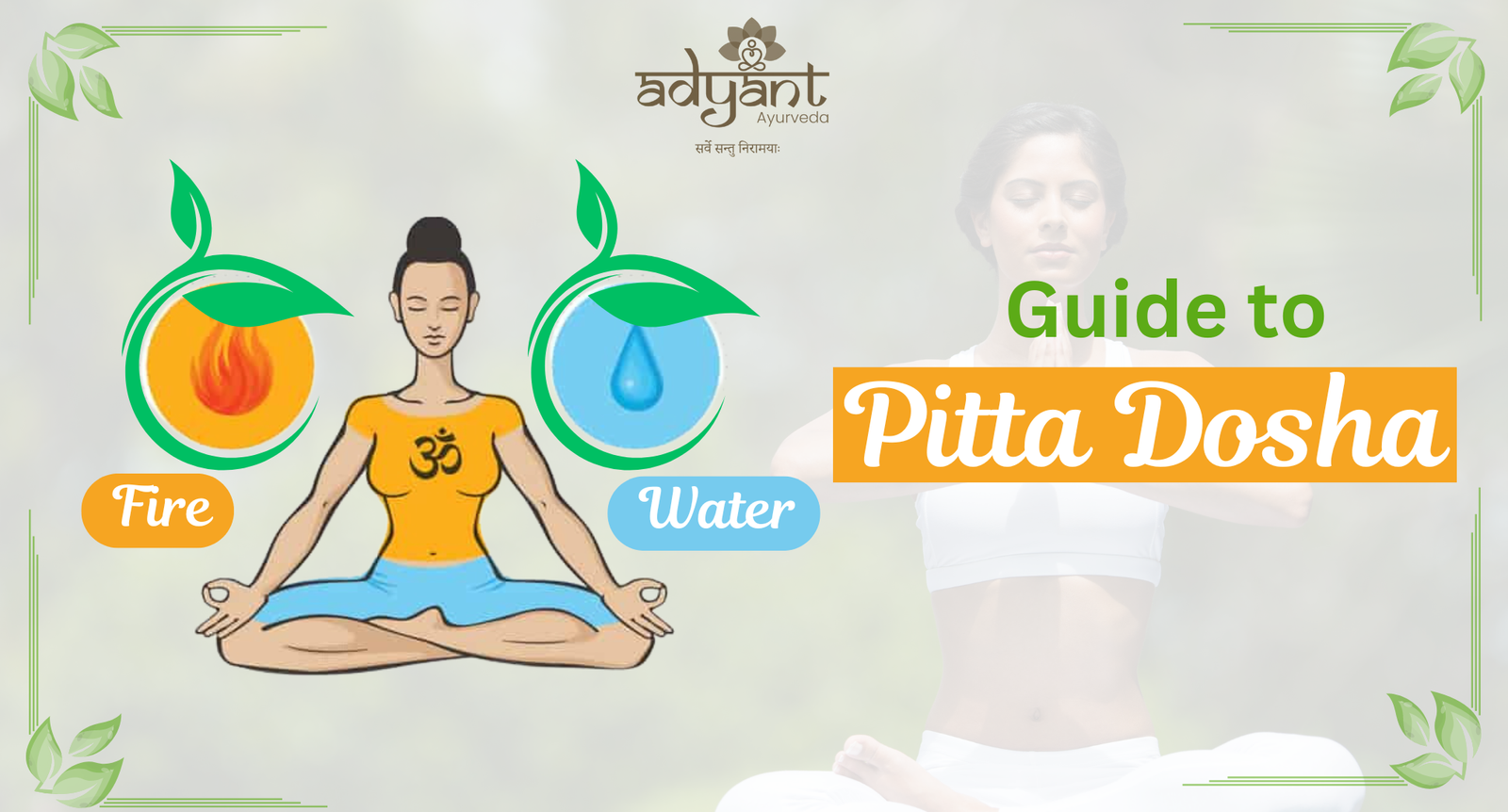Table of Contents
ToggleInfertility affects more than 15% of couples globally, leading to emotional stress, hormonal imbalance, and unexplained reproductive challenges. While conventional treatments like IVF and hormonal therapies are widely used, they often address only the symptoms, not the root cause.
Ayurveda, the time-tested holistic system of medicine, offers a transformative solution through Panchakarma—a powerful detox and rejuvenation therapy. Unlike temporary fixes, Panchakarma focuses on balancing the doshas (Vata, Pitta, Kapha), clearing reproductive toxins (Ama), and revitalizing the body at a cellular level.
If you’re searching for a natural fertility treatment, want to avoid the side effects of modern therapies, or are looking for the best Ayurvedic doctor for infertility in Bangalore, this guide will help. Backed by ancient wisdom and modern case insights, Panchakarma has emerged as one of the best Ayurvedic treatments for infertility for both men and women.
At Adyant Ayurveda, one of the best fertility clinics in Bangalore, we specialize in customized Panchakarma programs that address hormonal imbalances, PCOS, low sperm count, tubal blockages, and more—safely and naturally.
Let’s explore how Panchakarma can restore your fertility, support conscious conception, and guide you on your path to parenthood.
📊 Global & Indian Infertility Statistics
According to the World Health Organization (WHO), around 1 in 6 couples worldwide face infertility during their reproductive years. In India, the Indian Council of Medical Research (ICMR) estimates that 10–15% of couples struggle with infertility, with a rising trend due to lifestyle changes, stress, and late marriages.
👉 These numbers highlight the growing need for holistic and natural solutions like Ayurveda and Panchakarma.
📑 Ayurveda vs. Modern Infertility Treatments
| Aspect | Modern Treatments (IVF/IUI, Hormones) | Ayurveda & Panchakarma |
|---|---|---|
| Approach | Symptom management, assisted conception | Root-cause correction (dosha balance, detox, stress reduction) |
| Focus | Short-term conception success | Long-term reproductive health & conscious conception |
| Side Effects | Hormonal imbalance, mood swings, ovarian hyperstimulation, and cost burden | Minimal when guided by a BAMS doctor |
| Cost | ₹2–3 lakhs per IVF cycle (with multiple attempts possible) | Panchakarma packages are more affordable & holistic |
| Success Rates | IVF ~30–40% per cycle (varies by age/health) | Panchakarma improves natural fertility and also enhances IVF/IUI success rates is high up to 80% |
🧠 Vandhyatva in Ayurveda: Why Panchakarma for Infertility?
In Ayurveda, infertility is described as Vandhyatva. Core causes include:
Beejadosha (defects in sperm/ovum)
Shukra Dushti (sperm disorders) and Artava Dushti (ovarian/menstrual disorders)
Agnimandya (weak digestion) → Ama (toxins) → channel blockages (Avarana)
Vata vitiation—especially Apana Vata, which governs reproduction
Manasika factors (stress, anxiety, insomnia) that disturb the hormonal rhythm
Why Panchakarma?
It purifies reproductive tissues, balances Apana Vata, improves hormonal harmony, and enhances sperm/ovum quality and endometrial receptivity. It also serves as Garbhadhana-Samskara (pre-conception purification) for healthy progeny.
📖 Ayurvedic Causes of Infertility (Hetu)
Ayurveda attributes infertility (Vandhyatva) to lifestyle and health factors that disturb doshas and reproductive channels:
Excessive stress and mental strain
Ativyayama (over-exertion) or extreme sedentary habits
Viruddha Ahara (incompatible foods), excess oily/junk/processed food
Over-indulgence or suppression of natural urges
Environmental toxins and pollution
Chronic illnesses weaken Shukra Dhatu (semen) and Artava Dhatu (ovum)
📚 Charaka Samhita – Sharira Sthana explains that infertility arises from vitiated Shukra and Artava due to improper lifestyle and Ama accumulation.
🌸 Beeja, Kshetra, Ambu, Ritu: Four Pillars of Conception
Beeja (Seed): Quality of sperm & ovum—strengthened via Panchakarma + Rasayana.
Kshetra (Field): Healthy, toxin-free uterus—Uttara Basti purifies and rejuvenates.
Ambu (Nourishment): Proper nutrition & hormonal support through balanced Agni and Rasayana.
Ritu (Time): Aligning treatments with the fertile window for best results.
Panchakarma ensures all four are optimized.
🧬 Understanding Infertility (Modern View)
Primary infertility: No conception despite regular unprotected sex.
Secondary infertility: Inability to conceive after a previous pregnancy.
Female causes: PCOS, thyroid imbalance, endometriosis, fibroids, poor egg quality, and uterine issues.
Male causes: Low sperm count, poor motility, hormonal imbalance, stress, and lifestyle toxins.
🧘 Ayurveda’s View on Fertility
Fertility depends on:
Shukra Dhatu (sperm & semen health)
Artava Dhatu (ovum & menstrual health)
Dosha → Effect on Fertility
Vata: Irregular cycles, poor sperm/egg quality
Pitta: Hormonal imbalance, PCOS, inflammation
Kapha: Weight gain, cysts, sluggish metabolism
🌿 How Panchakarma Boosts Fertility
Detoxifies & balances hormones
Improves egg & sperm quality
Reduces stress (Shirodhara, Abhyanga, Takradhara)
Improves digestion & nutrient absorption
Enhances endometrial receptivity & pelvic circulation
🕉️ Pre-Conception Panchakarma Timeline (3–6 Months)
Phase 1 – Purification (Shodhana):
Snehana (oleation), Swedana (fomentation), Shodhana (detox).
Phase 2 – Pacification (Shamana):
Light digestives, herbal formulations to stabilize doshas and Agni post-detox.
Phase 3 – Strengthening (Rasayana):
Fertility herbs like Shatavari, Ashwagandha, Gokshura, and Kapikacchu.
Phase 4 – Conscious Conception:
Fertile-period guidance, mental balance, and Garbha Sanskar practices.
This holistic process improves conception chances and supports a healthy pregnancy.
🌿 Seasonal Panchakarma & Preventive Fertility Care
Ayurveda recommends Ritucharya Panchakarma (seasonal detox, especially in spring and autumn) even for healthy couples who wish to conceive later.
Benefits:
Preserves ovarian reserve and sperm quality
Prevents premature aging of reproductive tissues
Reduces risk of recurrent IVF failure or miscarriages
🔄 Panchakarma Therapies for Infertility
Core Panchakarma:
Vamana (Therapeutic Emesis): Clears Kapha toxins, helpful in cystic/kapha-dominant states.
Virechana (Purgation): Removes Pitta toxins, supports liver–hormone axis & ovarian function.
Basti (Medicated Enema): Balances Vata, improves pelvic circulation.
Yapana Basti: Nourishes reproductive tissues.
Matra Basti: Gentle, daily Vata pacification for semen & cycle regularity.
Uttara Basti: Intra-uterine/urinary route; considered effective in PCOS, tubal block, endometrial issues, and oligospermia.
Nasya (Nasal Therapy): Acts on the hypothalamic–pituitary axis; supports endocrine balance.
Raktamokshana (Bloodletting): Enhances uterine/ovarian circulation; used in endometriosis/PCOS-related congestion.
Udvartana & Swedana: Kapha-shamaka dry powder massage + fomentation—useful in PCOS, obesity, sluggish metabolism.
Shirodhara/Takradhara & Abhyanga: Stress regulation, sleep balance, mind–body harmony.
⚠️ Not recommended during pregnancy, severe anemia, uncontrolled diabetes or hypertension, extreme weakness, acute infections, active menstruation, or immediately postpartum. Always under qualified BAMS supervision.
🧑⚕️ Male Infertility – Ayurvedic Insights
Nearly 40–50% of infertility cases are male-related. Ayurveda emphasizes strengthening Shukra Dhatu.
Common Causes:
Low sperm count (oligospermia)
Poor motility (asthenozoospermia)
Varicocele
Erectile dysfunction & premature ejaculation
Hormonal issues (testosterone/thyroid)
Lifestyle: alcohol, smoking, excess heat exposure, obesity, long sitting
Benefits of Panchakarma for Men:
Virechana & Yapana Basti: Improve sperm quality, motility, semen viscosity
Nasya: Supports hormonal regulation
Rasayana: Kapikacchu, Ashwagandha, Gokshura for count, motility, vitality
👩 Female Infertility – Beyond PCOS
Explained in Ayurveda as Artava Dushti.
Key Causes:
Premature Ovarian Insufficiency (low AMH)
Luteal Phase Defect (weak endometrium)
Uterine fibroids & polyps (Kshetra obstruction)
Thyroid & hyperprolactinemia
Fallopian tube blockage/Hydrosalpinx (Kapha + Ama)
Useful Therapies:
Uttara Basti: PCOS, tubal blocks, endometrial receptivity
Virechana: Pitta balance, ovulatory rhythm
Raktamokshana: Pelvic congestion, endometriosis
🧪 Ayurvedic Diagnosis Before Panchakarma
Agni & Ama assessment
Prakriti–Vikriti analysis
Dosha dominance & Shodhana readiness
Baseline metrics (weight, vitals) and individualized planning
🪷 Post-Panchakarma Rasayana Therapy
After detox, Rasayana rebuilds strength, fertility, and immunity.
Top Ayurvedic Herbs for Fertility:
Ashwagandha – boosts sperm, reduces stress
Shatavari – supports female reproductive health
Gokshura – male fertility & vigor
Kapikacchu – increases sperm count
Amla – detoxifies & rejuvenates tissues
Lodhra – balances female hormones
Vidarikand – enhances stamina
Classical Ghritas (medicated ghee):
Phala Ghrita, Shatavari Ghrita—traditionally used for fertility support (only under doctor supervision).
🧘 Yoga, Meditation & Lifestyle for Fertility
Asanas: Setu Bandhasana, Viparita Karani, Baddha Konasana
Pranayama: Anulom-Vilom, Nadi Shodhana, Bhramari
Mind–Body (Satva) Practices: Dhyana (meditation), mantra-sadhana, gratitude journaling, mindful breathing before sleep
Lifestyle: Satvik diet, toxin-free living, Dinacharya & Ritucharya, regular sleep, digital detox
For couples delaying conception: seasonal Ritucharya Panchakarma, micronutrient-dense diet, stress reduction, and periodic fertility assessments to preserve reproductive reserve.
🥗 Role of Diet (Pathya–Apathya) in Infertility
Fertility-Supportive Foods:
Milk, ghee, soaked nuts, sesame, moong dal, leafy greens, pomegranate, figs, dates, warm water, and whole grains.
Spices to Support Agni:
Cumin, fennel, coriander, ajwain, turmeric, and ginger.
Avoid (Apathya):
Junk/processed foods, alcohol, excess caffeine, Viruddha Ahara (e.g., milk + sour fruits), curd at night, deep-fried foods, reheated oils, cold/ice drinks, excessive fermented foods.
📚 Ashtanga Hridaya – Sutrasthana recommends a Rasayana-rich diet for fertility.
Sample One-Day Fertility Menu (Indicative):
Morning: Warm water + ghee; soaked almonds & raisins
Breakfast: Moong dal khichadi with ghee; pomegranate
Lunch: Red rice, dal, sautéed leafy greens, sesame raita (daytime only)
Evening: Warm herbal infusion (cumin–fennel–coriander)
Dinner: Vegetable stew, millet roti, a tsp Phala Ghrita (if prescribed)
🧪 Integration with Modern Diagnostics & ART
At Adyant Ayurveda, we blend Ayurveda with modern science:
Ultrasound – ovarian reserve, uterine health, tubal assessment
Hormonal tests – AMH, FSH, LH, Testosterone, Prolactin, TSH
Semen analysis – count, motility, morphology
Endometrial thickness monitoring (implantation readiness)
Pre-IVF/IUI Preparation:
6–12 weeks of targeted Panchakarma & Rasayana can improve egg/sperm quality, reduce oxidative stress, and enhance endometrial receptivity, potentially supporting ART success.
🛡️ Safety & Contraindications of Panchakarma
Panchakarma must be doctor-supervised. At Adyant Ayurveda, every patient undergoes a Nadi Pariksha, blood work, and hormonal evaluation before treatment.
Avoid/Defer Panchakarma if:
Pregnant or actively trying to conceive within the same cycle
Severe anemia, cancer, uncontrolled hypertension/diabetes
Active infections, acute illness, active menstruation, immediate postpartum, extreme weakness
⚠️ Always consult a qualified BAMS doctor. Protocols are personalized—self-detox is unsafe.
🌿 Case Studies & Success Stories (Adyant Ayurveda)
Male infertility with diabetes (Age 36): After 3 months of Basti + Rasayana, sperm motility improved by 65%, leading to natural conception.
Female tubal blockage (Age 32): Uttara Basti for 5 cycles aided partial clearance; conceived within 8 months.
PCOS with irregular cycles (Age 28): Panchakarma + Shatavari Rasayana regularized cycles in 4 months; ovulation confirmed by ultrasound.
Clinic outcomes also show: PCOS ovulation restoration ~70% (3–6 months); male motility ↑ ~65% after Basti + Rasayana; tubal issues improved in ~70% following Uttara Basti (case-series context).
🔹 Successful Ayurvedic Management of Tubal Blockage
Explore how Ayurvedic therapies at Adyant Ayurveda helped a patient overcome tubal blockage and conceive naturally.
👉 Read the full case study
🔹 Oligospermia with Type 2 Diabetes – A Success Story
Discover how Ayurveda treats oligospermia and diabetes together, restoring fertility and health.
👉 Read the full case study
🔹 Overcoming PCOD Naturally through Ayurveda sueess stories
Learn how a holistic Ayurvedic approach managed PCOD and restored hormonal balance and reproductive health.
👉 Read the full case study
🌸 Preventive Care in Infertility & Before Conception
Panchakarma helps prevent:
Recurrent miscarriages
Repeated IVF failures
Thin endometrium
Pregnancy complications due to weak reproductive tissues
Ayurveda promotes “Swasthasya Swasthya Rakshanam”—maintaining health proactively. Garbha Sanskar prepares the mind–body for conscious conception and healthy progeny.
🧘 Mental Health & Infertility
Stress, anxiety, and poor sleep disturb hormones (cortisol–prolactin axis).
Therapies: Shirodhara (mental calmness), Abhyanga (nervous system balance), Takradhara (cooling & Pitta-pacifying).
Practices: Guided meditation, yoga nidra, pranayama, screen detox 60–90 mins before sleep.
🌿 Best Ayurvedic Doctor for Infertility in Bangalore (Adyant Ayurveda)
Adyant Ayurveda is widely recognized as one of the best fertility clinics in Bangalore, trusted across India for 28+ years of reproductive Ayurveda.
Our Expert Team Includes:
Dr. Shree Lakshmi (Jayanagar): Senior Ayurvedic Fertility Specialist; 28+ years; Panchakarma & Garbha Sanskar
Dr. Vidya (Kalyan Nagar): Women’s health, PCOS, endometriosis, Ayurvedic dietetics; 18 years
Dr. Preethi (Rajarajeshwari Nagar): Hormonal imbalance, lifestyle disorders, reproductive wellness
Dr. Sumana (Indiranagar): Stress-related infertility; skin & reproductive health.
Dr. Bhagyalakshmi( Bannerghatta Road ) with 22 years of expertise in treating infertility through Ayurveda and Panchakarma,
Centers: Jayanagar | Indiranagar | Kalyan Nagar | Rajarajeshwari Nagar | Bannerghatta Road
📚 Research & Case Resources
Panchakarma in Infertility – PubMed
Ayurveda & Infertility – NCBI
Ayurvedic Male Infertility – ResearchGate
Impact of Detoxification – ScienceDirect
Ayurvedic Treatment for Low AMH – PubMed
(Use as supporting resources; therapy suitability varies by individual.)
📊 Success Rates & Clinical Outcomes at Adyant Ayurveda
PCOS-related infertility: ~70% reported regular ovulation within 3–6 months
Male infertility (low motility): ~65% improvement after Basti + Rasayana
Tubal blockages: ~70% showed improvement after Uttara Basti
Figures are clinic-reported case outcomes; individual results vary.
Doctors Voice on Panchakarma for Infertility Treatment
Patients Voice on Panchakarma for Infertility Treatment
Frequently Asked Questions (FAQs) about Panchakarma and Infertility Treatment
1. How does Panchakarma improve fertility?
Panchakarma detoxifies the reproductive system, balances hormones, and improves circulation, addressing common fertility issues like PCOS, low sperm count, and endometriosis.
2. Is Panchakarma suitable for both men and women?
Yes, it benefits both men and women by improving sperm health, egg quality, and hormonal balance.
3. What are the main Panchakarma therapies for infertility?
Virechana (Purgation)
Basti (Enema Therapy)
Vamana (Therapeutic Vomiting)
Nasya (Nasal Therapy)
4. How long does Panchakarma take for infertility?
Typically, 7-21 days, depending on the individual’s health and treatment plan.
5. Is Panchakarma safe for infertility treatment?
Yes, when done under professional guidance, Panchakarma is safe and effective.
6. Can Panchakarma be combined with other treatments?
Yes, it can complement conventional fertility treatments like IVF by improving overall reproductive health.
7. What lifestyle changes should I make during Panchakarma?
A balanced diet, stress management techniques like yoga, and avoiding alcohol and processed foods are recommended.
8. How does Panchakarma help with PCOS and endometriosis?
Panchakarma balances hormones, reduces inflammation, and promotes better ovarian function in conditions like PCOS and endometriosis.
9. Can Panchakarma improve sperm count?
Yes, Basti and other therapies improve sperm quality, count, and motility.
10. How soon will I see results from Panchakarma?
Results can vary, but improvements in menstrual cycles and sperm quality are often noticed within 3-6 months.
11. What is the success rate of Ayurvedic infertility treatment?
While results vary, Ayurvedic treatments like Panchakarma have shown success in improving fertility by restoring hormonal balance and detoxifying the body. Many individuals experience improvements in egg quality, sperm count, and overall reproductive health.
12. Should I undergo Panchakarma before pregnancy?
Yes, Panchakarma is recommended before pregnancy as it prepares the body by detoxifying and improving reproductive health, optimizing conditions for conception.
13. How does Panchakarma help in male infertility?
Panchakarma improves sperm count, motility, and overall reproductive health in men by cleansing toxins from the body and balancing hormonal levels.
14. Can I get pregnant after Panchakarma treatment?
Yes, many women have conceived after completing Panchakarma as it enhances fertility by promoting hormonal balance, detoxifying the reproductive organs, and improving ovarian health.
15. What is the best time to conceive according to Ayurveda?
Ayurveda suggests that the best time to conceive is during the fertile phase of the menstrual cycle, ideally around ovulation, when the body is balanced and Prakriti (individual constitution) is in harmony.
16. Which infertility treatment is best in Ayurveda?
Ayurveda uses a combination of therapies, including Panchakarma, herbal treatments, dietary adjustments, and lifestyle changes to address the root causes of infertility. Panchakarma therapies like Virechana, Basti, and Nasya are commonly recommended.
17. How to increase fertility after the age of 35?
After 35, Panchakarma can help enhance fertility by improving egg quality, balancing hormones, and increasing circulation. A healthy diet, stress reduction, and Ayurvedic herbs like Ashwagandha and Shatavari are also beneficial.
18. Which medicine is best for infertility in Ayurveda?
Medicines like Shatavari, Ashwagandha, Gokshura, Lodhra, and Guduchi are often recommended to balance hormones, improve fertility, and support reproductive health.
19. How can I boost my fertility to get pregnant?
To boost fertility, Ayurveda recommends treatments like Panchakarma, lifestyle changes, stress management, a nutrient-rich diet, and herbs like Shatavari and Ashwagandha to support reproductive health.
20. How does Ayurveda treat low AMH levels?
Ayurvedic treatments for low AMH (Anti-Müllerian Hormone) levels focus on improving ovarian function, balancing hormones, and detoxifying the body using therapies like Basti, Virechana, and herbs like Ashwagandha and Shatavari.
✅ Conclusion: Embrace Ayurveda for Natural Fertility
Panchakarma is a profoundly transformative therapy for infertility, targeting root causes: toxins, dosha imbalance, weak digestion, and stress—while strengthening Shukra/Artava Dhatus and harmonizing hormones.
At Adyant Ayurveda, our expert team led by Dr. Shree Lakshmi (BAMS; 28+ yrs) combines authentic Ayurveda with modern diagnostics to deliver safe, effective, and personalized fertility care.
Locations: Jayanagar | Indiranagar | Kalyan Nagar | Rajarajeshwari Nagar | Bannerghatta Road
Book Your Consultation: +91 9972541009
Visit: www.adyantayurveda.com
✍️ Authored & reviewed by Dr. Shree Lakshmi (BAMS), Ayurvedic Fertility Specialist at Adyant Ayurveda, with 28+ years of clinical experience in treating infertility through Panchakarma.
⚠️ Disclaimer: This content is for educational purposes only and not a substitute for professional medical advice. Panchakarma must be undertaken under the guidance of a qualified Ayurvedic doctor. Individual results may vary.









